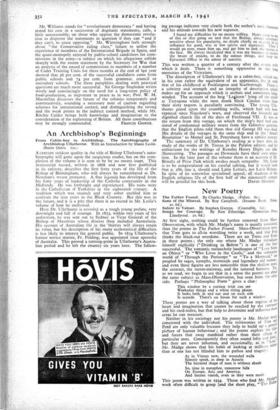An Archbishop's Beginnings
From Cabin-boy to Archbishop. The Autobiography of Archbishop Ullathorne. With an Introduction by Shane Leslie. (Burns Oates. 15s.) A CERTAIN strident quality in the title of Bishop Ullathome's auto- biography will grate upon the suspicious reader, but on the com- pletion of the volume it is seen to be by no means inapt. This manuscript record, written in 1868 and now first published in ifs entirety, describes the first forty years of the life of the Bishop of Birmingham, who- will always be remembered as Dr. Newman's wisest protector. A fine legenda has developed from his forty years of leadership of the Catholic community in the Midlands. He was forthright and experienced. His roots were in the Catholicism of Yorkshire in the eighteenth century. A tradition which was staunch and very sober enabled him to confront the iron years in the Black Country. But this was in the future, and it is a pity that there it no record in Mr. Leslie's volume of how he mellowed.
Here Dr. Ullathorne is revealed as a tough young prelate, very downright and full of courage. In 1833, within two years of his ordination, he was sent out to Sydney as Vicar General of the Bishop of Mauritius whose diocese then included Australasia. His account of Australian life in the 'thirties will always retain its value, but his description of his many ecclesiastical difficulties is less likely to interest the general public. In 1834 Ullathorne's former novice master, Fr. Polding, was appointed vicar apostolic of Australia. This proved a turning-point in Ullathorne's Austra- lian period and he left the country six years later. The follow-
ing passage indicates very clearly both the author's own character and his attitude towards his new superiOr.
I found my difficulties by no means trifling. News came to me of this or that going on and that the Bishop, always extremely sensitive about his popularity, no doubt chiefly on account of its influence for good, was in low spirits and depressed. Then I would go over, rouse him up, and get him to look the matter in the face. He always inculcated that it was my business to receive the brunt of attacks, to do the odious things, and keep the Episcopal Office in the odour of sanctity.
This was written -a quarter of a century after the events with which it deals. There is something oppressive in the long memories of the Victorians.
The description of Ullathorne's life as a cabin-boy, which was in his case rather the equivalent of an apprentice, fits in with that of his childhood at Pocklington and Scarborough. There is a sobriety and -strength and an integrity of description which makes up for an approach which is archaic and sometimes long- winded. The account of the brig ' Leghorn ' lying off the wharf at Tarragona while the men drank black Catalan wine from their -dirty teapots is peculiarly convincing. The young Ulla. thorne gaied upon the crumbling walls, which had not been repaired since Napoleon's wars, and observed the leisurely and dignified church life of the days of Ferdinand VII. It was on the return from this voyage, on which the ship's beef had con- sisted of condemned military stores from the Gibraltar garrison, that the English pilots told them that old George III was dead. His details of the voyages in the same ship and in the ` Anne's Resolution' to Memel and St. Petersburg have a similar interest The summary of Dr. Ullathorne's reading at a later date, his study of the works of St. Teresa in the Palafox edition, and his enthusiasm for the writings of Kenelm Henry Digby are alike illuminating. The passages on" Downsidehave their own attrac- tion. In the later part of the volume there is an account of Dr. Brindle of Prior Park which awakes much sympathy. Mr. Leslie is to be congratulated on his careful editing, but it would seem that p. 286, line 2, should read Latin Letters, not Latin Bishops. In spite of its somewhat specialised appeal,' all students of the English religious life of the first half of the .nineteenth century






























 Previous page
Previous page